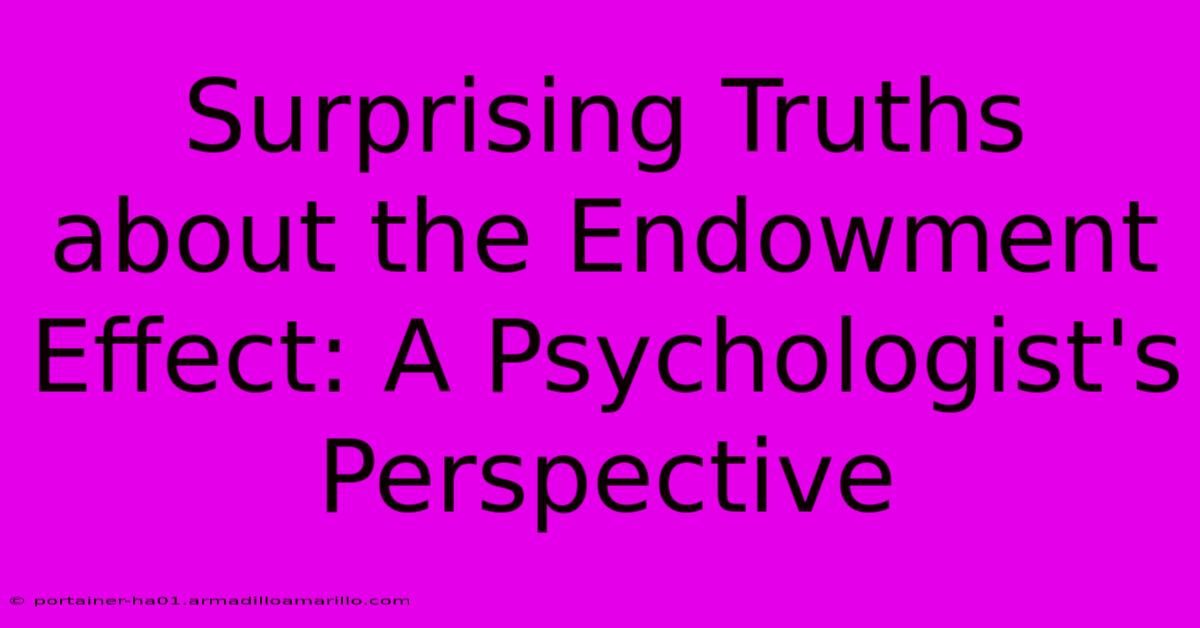Surprising Truths About The Endowment Effect: A Psychologist's Perspective

Table of Contents
Surprising Truths about the Endowment Effect: A Psychologist's Perspective
The endowment effect, a cornerstone of behavioral economics, describes our tendency to place a higher value on things we own than on identical things we don't own. It's why selling a beloved item feels painful, even if we could make a profit. While seemingly simple, the endowment effect reveals surprising truths about human psychology and decision-making. This article delves into these surprising aspects, offering a psychologist's perspective on this fascinating phenomenon.
Beyond Simple Ownership: The Emotional Attachment Factor
The endowment effect isn't merely about possession; it's deeply intertwined with emotional attachment. We don't just value things; we imbue them with personal significance, memories, and identity. Think of a worn-out teddy bear from childhood or a hand-me-down family heirloom. Their monetary worth is negligible, yet their sentimental value is immeasurable, significantly influencing our selling price. This emotional connection supersedes the objective market value, showcasing the powerful influence of feelings on our economic decisions.
The Role of Loss Aversion
Loss aversion, a closely related concept, further amplifies the endowment effect. The pain of losing something we own is generally felt more strongly than the pleasure of gaining something of equal value. This psychological asymmetry makes us unwilling to part with possessions, even if a profitable offer is presented. We're more motivated to avoid losses than to acquire gains, irrationally inflating the perceived value of our belongings.
Challenging Traditional Economic Models
The endowment effect directly contradicts the principle of rational choice in traditional economics. Rational choice theory assumes individuals make decisions based on objective assessments of costs and benefits. However, the endowment effect demonstrates that our decisions are often skewed by emotional biases and subjective valuations, creating a significant departure from perfectly rational behavior. This discrepancy highlights the limitations of purely rational economic models and necessitates the incorporation of psychological factors for a more accurate understanding of human economic behavior.
Context Matters: Situational Influences on the Endowment Effect
The strength of the endowment effect isn't constant; it varies depending on several contextual factors. For instance, the effect is stronger when the item has personal significance or when the decision is made under time pressure. Conversely, factors like the ease of replacing the item or the availability of similar alternatives can weaken the effect. Understanding these situational influences provides crucial insights into when the endowment effect is most likely to manifest and how it might be mitigated.
The Impact of Market Experience
Surprisingly, the endowment effect is not universally experienced. Individuals with extensive market experience, such as seasoned traders or collectors, tend to exhibit a weaker endowment effect. This suggests that repeated exposure to market transactions and a focus on objective valuation can partially mitigate the emotional biases associated with ownership. This finding offers a potential avenue for reducing the impact of this cognitive bias in specific situations.
Practical Implications and Applications
Recognizing the endowment effect has significant practical implications in various fields:
- Negotiations: Understanding the effect helps negotiators anticipate and address the emotional barriers to reaching mutually beneficial agreements. Framing offers strategically can mitigate the impact of loss aversion.
- Marketing: Marketers can leverage the endowment effect by creating a sense of ownership and personal connection with their products. Free trials and product demos are effective examples of this strategy.
- Environmental Policy: Understanding the endowment effect is crucial in designing effective environmental policies. Framing environmental protection as preventing loss, rather than promoting gain, may prove more persuasive.
Conclusion: A Deeper Understanding of Human Behavior
The endowment effect is more than just an interesting quirk of human psychology; it’s a window into the intricate interplay between emotion, cognition, and economic decision-making. By acknowledging its surprising truths, we can gain a deeper understanding of human behavior and improve our approaches to negotiation, marketing, and policy-making. Future research focusing on the neural correlates and individual differences in the endowment effect will further enhance our knowledge and enable more effective interventions.

Thank you for visiting our website wich cover about Surprising Truths About The Endowment Effect: A Psychologist's Perspective. We hope the information provided has been useful to you. Feel free to contact us if you have any questions or need further assistance. See you next time and dont miss to bookmark.
Featured Posts
-
Cats Eye Nail Polish The Purrfect Accessory For Your Next Night Out
Feb 07, 2025
-
Behold The Hexquisite Hue Unveil The Secret Code Of Baguette Perfection
Feb 07, 2025
-
Transform Your Media Experience The Vga To Hdmi Adapter That Breaks Down Barriers
Feb 07, 2025
-
The Cameras Secret Weapon V60 Vs V90 Sd Cards Unlocking The Potential Of Your Photo And Video Gear
Feb 07, 2025
-
The Radical Transformation How Becoming A Christian Can Empower Your Whole Being
Feb 07, 2025
